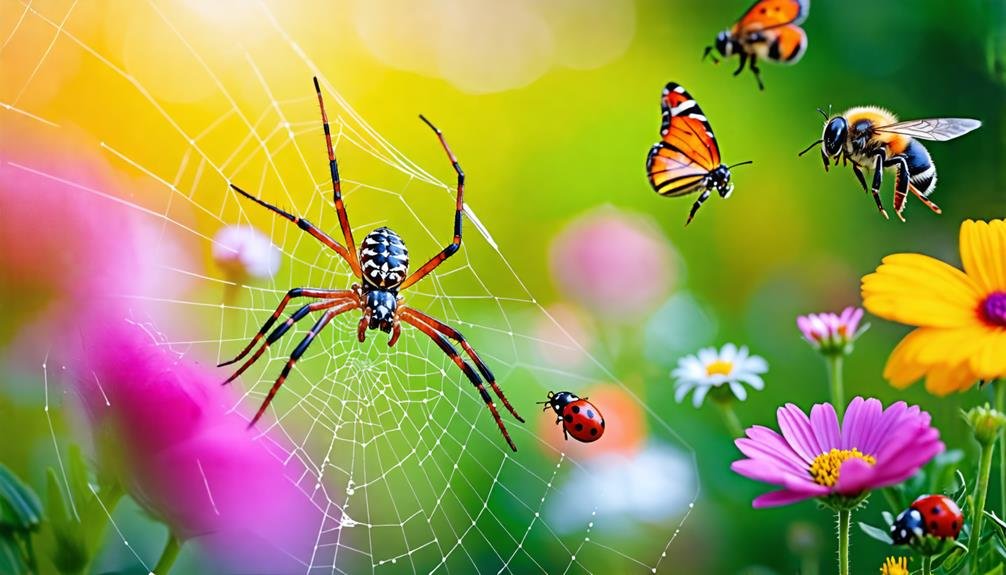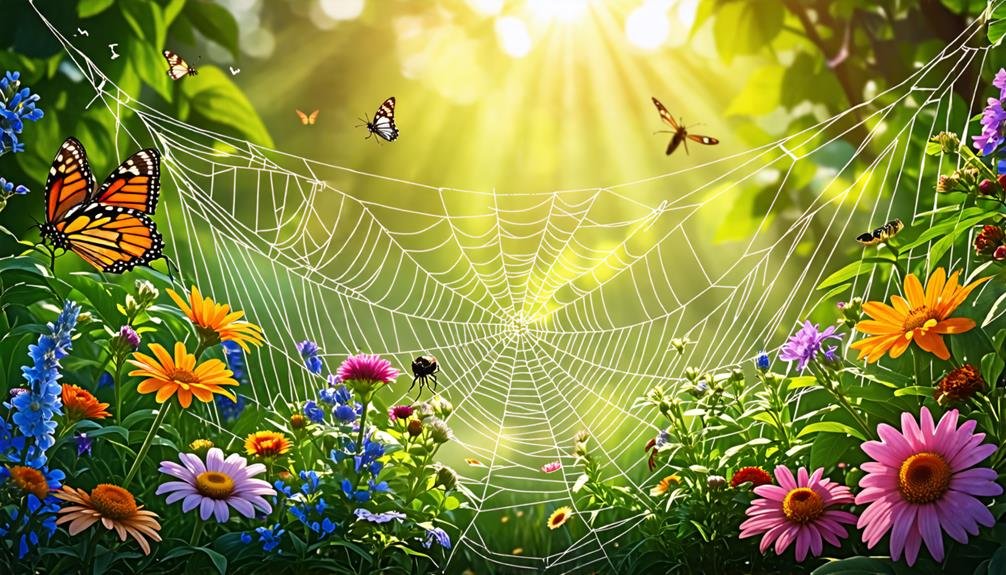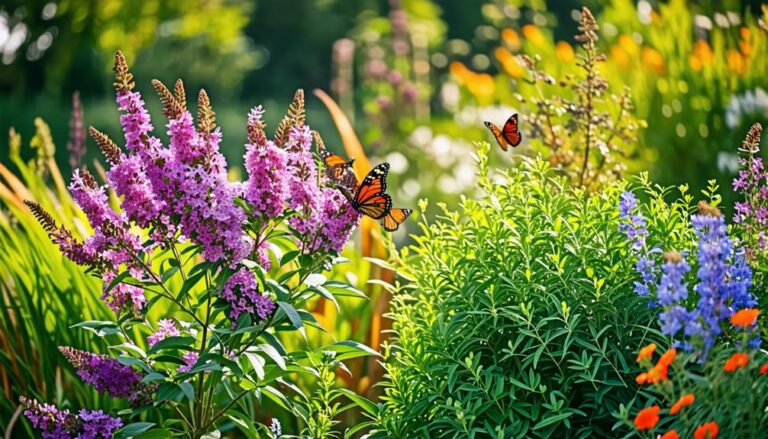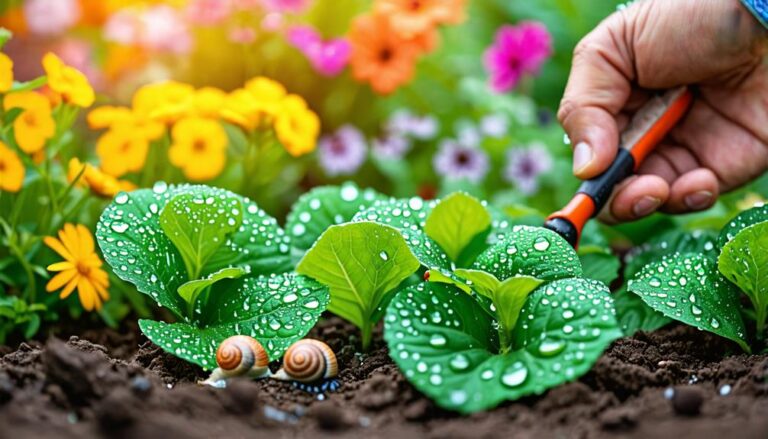Spiders play a vital role in your garden by naturally controlling pests and promoting plant health. They hunt down harmful insects like aphids and caterpillars, reducing the need for chemical pesticides. Spiders also help prevent the spread of plant diseases by keeping mosquito and tick populations in check. When spiders are killed, pest populations can grow unchecked, which threatens the balance of your garden ecosystem. By allowing spiders to thrive, you foster a healthier environment for your plants and encourage biodiversity. Understanding their benefits can transform your perspective on these helpful creatures, leading to a more vibrant garden.
Spiders as Natural Pest Controllers
Spiders act as essential natural pest controllers in gardens, effectively managing populations of harmful insects such as aphids, caterpillars, and beetles that threaten plant health. By preying on these pests, these remarkable arachnids play a crucial role in maintaining a thriving garden. When you cease eliminating spiders in your outdoor space, you enable these beneficial predators to uphold a balanced ecosystem, which is vital for the health of your plants.
Garden spiders, including species like the common garden spider (Araneus diadematus), provide numerous advantages by decreasing the number of destructive insects that can harm your vegetation. Their presence typically results in fewer plant-eating bugs, reducing the need for harmful pesticides that can disrupt the environment. By endorsing natural pest control, you not only safeguard your plants but also create a safer habitat for beneficial insects and pollinators like honeybees and ladybugs.
Moreover, spiders pose no harm to plants, as they exclusively target pests that threaten them. Welcoming these eight-legged allies can lead to a healthier garden while enhancing biodiversity. Recognizing the benefits of garden spiders will empower you to appreciate their role in maintaining a harmonious ecosystem. So, allow them to thrive, and enjoy the natural pest control they provide for your flourishing garden.
The Role of Spiders in Disease Prevention
How do arachnids aid in disease prevention within horticultural spaces? Arachnids play a crucial role in protecting our flora and our well-being by managing the populations of detrimental insects. For instance, they consume aphids, which can transmit diseases among plants. By regulating these pests, arachnids help avert the spread of pathogens that cause plant diseases. Furthermore, arachnids also prey on mosquitoes and ticks, which are recognized vectors of various illnesses affecting humans.
Incorporating arachnids into your horticultural ecosystem serves as a powerful method for disease prevention. By adhering to straightforward gardening practices, such as avoiding chemical pesticides that harm beneficial organisms, you enable arachnids to flourish and uphold their essential functions. Moreover, establishing diverse habitats and planting indigenous flora can attract insects that arachnids consume, ultimately boosting the vitality of your garden.
Common Garden Spiders to Know

Knowing the various types of spiders in your yard can enhance your understanding of their importance in controlling pests and preventing diseases. Learning about common garden spiders can help you appreciate their advantages and alleviate any concerns you might have.
- Argiope aurantia (Yellow Garden Spider): This striking arachnid weaves large, circular webs and is frequently spotted in sunlit spots. As skilled predators, they tackle a wide array of garden insects.
- Agelenopsis spp. (Grass Spider): Characterized by their funnel-shaped webs, these spiders inhabit lawns and grassy areas. They are swift and nimble, capturing insects that stray too near.
- Lycosidae (Wolf Spider): Larger and sturdier, wolf spiders do not use webs to ensnare prey. Instead, they are active hunters, making them significant partners in your garden ecosystem.
Ecosystem Benefits of Spiders
Spiders play a vital role in maintaining the health of your garden by acting as natural pest controllers. They consume harmful insects like aphids and caterpillars, which helps prevent significant damage to your plants. Moreover, by eating bugs that carry diseases, spiders not only protect your garden but also contribute to a safer environment for everyone.
Natural Pest Control
Spiders play a crucial role in natural pest management within gardens, effectively controlling populations of detrimental insects that can harm plants. By fostering spiders in your garden, you can create a thriving ecosystem for your flora while minimizing the use of harmful chemicals. Here are three key contributions of spiders to pest management:
- Insect Predation: Spiders actively hunt and consume various pests, including aphids, caterpillars, and beetles. Their predatory behavior significantly lowers the risk of infestations that can threaten plant health.
- Ecosystem Balance: Spiders help regulate insect populations, which is essential for maintaining a balanced ecosystem. This equilibrium supports the coexistence of beneficial insects alongside spiders, promoting garden vitality.
- Chemical Reduction: Leveraging spiders for pest control reduces the dependency on chemical pesticides, which can adversely affect beneficial insects and the environment. This strategy creates a safer habitat for plants and wildlife.
Welcoming spiders as partners in your garden can enhance plant health and enrich the ecosystem, allowing nature's processes to thrive effectively.
Disease Prevention Role
Spiders contribute significantly to disease prevention in garden ecosystems. They control insect populations that can carry harmful pathogens, including pests like aphids and mosquitoes. These insects pose risks to both plants and humans by transmitting diseases. Through their predatory behavior, spiders help mitigate the spread of these diseases, promoting a healthier garden environment.
For example, aphids are well-known for spreading viral infections among plants, which can result in severe crop loss. By preying on these pests, spiders support plant vitality and prevent disease outbreaks. Additionally, spiders hunt mosquitoes and ticks, which are recognized carriers of illnesses such as West Nile virus and Lyme disease, thus safeguarding gardeners and their families.
Creating a spider-friendly garden enhances this protective function. By steering clear of pesticides and cultivating diverse habitats, gardeners can encourage spider populations to flourish. This approach not only contributes to a balanced ecosystem but also allows nature to operate harmoniously. Welcoming spiders into the garden leads to a healthier and safer gardening experience for both flora and people.
Impact of Killing Spiders

Killing spiders in your garden can lead to increased pest populations, as these natural predators play a vital role in keeping harmful insects in check. Without spiders, bugs like aphids and caterpillars can multiply rapidly, potentially damaging your plants and spreading diseases. Moreover, the absence of spiders may disrupt the balance of your garden's ecosystem, resulting in unintended consequences for both plant health and local biodiversity.
Increased Pest Populations
Removing arachnids from your garden can lead to a significant rise in pest populations, as these natural predators are vital in managing harmful insects. When arachnids are removed, the equilibrium of your garden ecosystem is disturbed, allowing pests to flourish without restraint. This can result in heightened damage to your flora and a more challenging gardening endeavor.
Here are three key pests that arachnids help regulate:
- Greenflies: These minute insects can rapidly reproduce and extract sap from plants, weakening them and causing stunted growth.
- Larvae: Known for devouring foliage, larvae can strip plants bare, leading to severe harm if left unchecked.
- Scarabs: Certain scarabs can devastate fruits and vegetables, significantly affecting your garden's harvest.
Disease Spread Risk
Removing arachnids from a horticultural space significantly elevates the likelihood of illness transmission among flora. This absence allows pest populations, such as aphids and beetles, to flourish without restraint. These insects not only harm vegetation but also carry pathogens that can wipe out entire gardens. For example, aphids are infamous for spreading viruses that hinder plant growth, resulting in diminished yields and weak plants.
Moreover, arachnids are crucial for managing populations of mosquitoes and ticks, which can transmit various diseases to humans. By preying on these insects, arachnids help safeguard both plants and human health. When arachnids are removed, the natural equilibrium is disrupted, enabling disease-bearing pests to multiply, which leads to a series of problems that undermine plant vitality and garden productivity.
Thus, maintaining arachnids in your garden is vital for curbing disease transmission. By allowing these natural hunters to thrive, you can cultivate a healthier horticultural environment that benefits both your plants and your health. Welcoming arachnids is a proactive approach to nurturing a vibrant ecosystem that shields your garden from threats.
Ecosystem Imbalance Consequences
Removing arachnids from the horticultural space disrupts the fragile equilibrium of the ecosystem, leading to unchecked surges in insect populations and subsequent harm to flora health. When arachnids are eradicated, several repercussions emerge that threaten the overall vitality of your garden.
- Insect Overpopulation: Without arachnids to regulate them, insects like aphids and caterpillars can increase exponentially, causing substantial damage to plants.
- Heightened Plant Pathology: Numerous insects serve as vectors for diseases. An uptick in their numbers can result in greater disease transmission among plants, undermining your garden's vitality.
- Chemical Dependency: As insect populations swell, gardeners may feel compelled to use chemical pesticides, such as those from Bayer or Ortho, which can further harm beneficial pollinators and perpetuate a cycle of imbalance.
Ultimately, the absence of arachnids not only impacts pest management but also jeopardizes the health and diversity of your garden. By acknowledging the crucial role arachnids play, you can cultivate a flourishing environment where plants thrive naturally. Embracing arachnids as allies in your horticultural endeavors can lead to a more robust ecosystem, allowing you to enjoy your outdoor space with peace of mind.
Creating a Spider-Friendly Environment
Creating a spider-friendly habitat in your backyard enhances biodiversity and promotes natural pest control, benefiting the health of plants. To build this environment, avoid using pesticides and herbicides that could harm spiders and beneficial insects. Instead, focus on cultivating a diverse array of flora, which will provide shelter and nourishment for spiders.
Encouraging spiders can be achieved by allowing them to weave webs in untouched sections of your yard. For instance, leaving certain corners undisturbed creates ideal spots for spider webs. Additionally, planting native flora like Echinacea or Rudbeckia can attract insects, serving as food sources for spiders and enriching the ecosystem.
Consider installing natural shelters, such as small piles of stones or logs, where spiders can find refuge and thrive. This type of habitat supports a robust spider population, which in turn helps control harmful pests like aphids and caterpillars. Share knowledge with friends and family about the vital role of spiders in maintaining a healthy garden ecosystem, fostering a more welcoming atmosphere. By implementing these strategies, you can cultivate a vibrant garden where spiders fulfill their crucial role without fear or harm.
Attracting Beneficial Insects

Creating a habitat that supports spiders naturally leads to an increase in beneficial insects, enhancing your garden's ecosystem. By cultivating an environment where spiders thrive, you also invite various insects that positively contribute to your garden's balance. Here are three effective methods to attract these beneficial insects:
- Plant native wildflowers: Native flora, such as coneflowers and black-eyed Susans, are more likely to attract local pollinators like honeybees and monarch butterflies, which help enhance plant reproduction and overall health.
- Establish diverse habitats: Incorporating different layers in your garden, such as tall sunflowers, low-growing clover, and natural stones, provides shelter for a variety of insects. These habitats promote a thriving ecosystem where spiders can find ample food sources.
- Utilize organic gardening methods: Avoid commercial pesticides that can harm beneficial insects. Instead, adopt natural pest control techniques, such as introducing ladybugs or using diatomaceous earth. This approach not only safeguards the insects you want but also ensures spiders have sufficient food to flourish.
Educating Others on Spider Importance
Spiders play a crucial role in maintaining a healthy garden ecosystem, which is vital for promoting sustainable gardening practices. By educating others about the significance of spiders, we can dispel common fears and misconceptions surrounding these arachnids. Many individuals perceive spiders as pests, but in reality, they serve as nature's pest control agents. By preying on harmful insects such as aphids and beetles, spiders help protect plants from serious damage. This natural method of pest management decreases the reliance on chemical pesticides, like those from brands such as Ortho, which can be detrimental to more than just unwanted insects.
Furthermore, spiders contribute to keeping gardens free from disease. They consume insects that may carry pathogens, thereby safeguarding both plants and humans from various illnesses. Sharing this information with friends and family encourages them to appreciate spiders rather than fear them.
To create a spider-friendly environment, consider cultivating diverse habitats in your garden. Providing shelter and allowing spiders to establish their webs will promote a balanced ecosystem. By informing others about the essential benefits of spiders, we can collectively foster a healthier garden. Highlighting these points during discussions or community events can inspire a shift in perspective, ultimately leading to a more harmonious relationship with these beneficial creatures.




